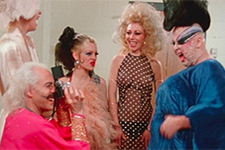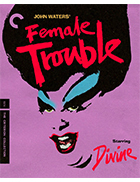Female Trouble
|  Cult director John Waters’s supreme achievement will always be Pink Flamingos (1972), his deranged home movie that took the midnight movie circuit by storm with its trashy excess, low-brow aesthetic, and raunchy delight in whatever perversions Waters could dream up. Pink Flamingos is the nadir of its genre, and, as Waters has said numerous times, it is the movie he had to compete with for the rest of his career. No moment was more crucial for Waters, then, than the follow-up to his most infamous of infamous achievements—would he simply deliver more of the same, would he somehow surmount Flamingos’ shabby perversity, or would he take a different route entirely? In a sense, he did all three in devising Female Trouble, which digs even deeper into the trash auteur’s fascination with criminality, the twisted nature of stardom, and the celebration of grotesquerie, obsessions he had been fusing into his celluloid bombs since his home-made short films like Eat Your Makeup (1968) and early features Mondo Trasho (1969) and Multiple Maniacs (1970). The film’s mantra is “crime is beauty,” a willfully absurdist credo that fits neatly with Waters’s love of “unattractive villains”—grotesque-beautiful Others—who become the heroes of his stories with their mission to offend and degrade the value systems held by those who would traditionally be considered “attractive heroes.” As with all of his earliest movies, Waters filmed Female Trouble in and around the working-class neighborhoods of his native Baltimore with his group of friends and close associates who called themselves the Dreamlanders after Dreamland Studios, the small production company Waters founded in his bedroom in the late ’60s. This group included the 300-pound transvestite Divine (née Glenn Milstead), Mary Vivian Pearce, David Lochary, Cookie Mueller, and Mink Stole (all actors), Vincent Peranio (production designer), and Pat Moran (casting director). Divine, having already played all manner of maniacs in Waters’s earlier films and who was last seen eating dog shit in the final frames of Pink Flamingos, stars as Dawn Davenport, a juvenile delinquent in 1960 whose life is set on a collision course with criminal media stardom when she runs away from home after her parents refuse to buy her the pair of cha-cha heels she wanted for Christmas. Her life becomes a strange odyssey that takes her from frustrated obscurity to notorious stardom as she morphs into a deranged, murderous performance artist who finds her greatest moment is when she is strapped into an electric chair after being handed a death sentence for murder. Most of the Dreamland cast members appear in various roles, including David Lochary and Mary Vivian Pearce as the fascistic owners of a beauty salon who brainwash Dawn to suit their “crime is beauty” theory, Mink Stole as Dawn’s bratty daughter who becomes a Hare Krishna, and Edith Massey as Dawn’s next-door neighbor who, in an amusing social twist, is terribly distraught over the fact that her son Gator (Michael Potter) isn’t gay. Female Trouble is every bit as outrageous as Pink Flamingos, even if it is decidedly more heavy-handed in trotting out its themes linking crime and high fashion. It does show that Waters was beginning to mature (if that’s the right word) in his filmmaking, consciously linking his absurd imagery to tangible themes, rather than a general urge to offend everyone. The film is unique as it is Waters’s most explicit early stab at satirizing the media and the overwhelming hype that is lavished on high-profile criminals, a theme to which he would later return in Serial Mom (1994). His filmmaking style had not changed much in the three years since he made Pink Flamingos, as in Female Trouble he continued his low-brow aesthetic of clumsy framing and an awkward use of zooms and pans, although technical advances (and a bigger budget) allowed for better sound and smoother edits, not to mention more kitschy bad-taste production design. As it turned out, Female Trouble was the beginning of the end of Waters’s early, outsider phase, as he would only make one more underground movie, Desperate Living (1977), before slowly making his way into the Hollywood mainstream with his first studio effort, Polyester (1980). Viewing his earlier work in light of what he did during the last two decades of his career, it is tempting to say that Waters “sold out” or “lost his edge” (it is still mind-boggling to think that Waters will be best remembered by the mainstream for the smash Broadway musical based on his 1988 film Hairspray). In the early 2000s he tried to reclaim some of his manic roots with films like Cecil B. DeMented (2000) and A Dirty Shame (2004), but as Waters himself has admitted, he simply mellowed with age. Female Trouble, on the other hand, has not, and it remains a twisted and incendiary exercise in often hilarious trash that truly has to be seen to be believed.
Copyright © 2018 James Kendrick Thoughts? E-mail James Kendrick All images copyright © The Criterion Collection | |||||||||||||||||||||||||||||||
Overall Rating: 

 (3)
(3)


